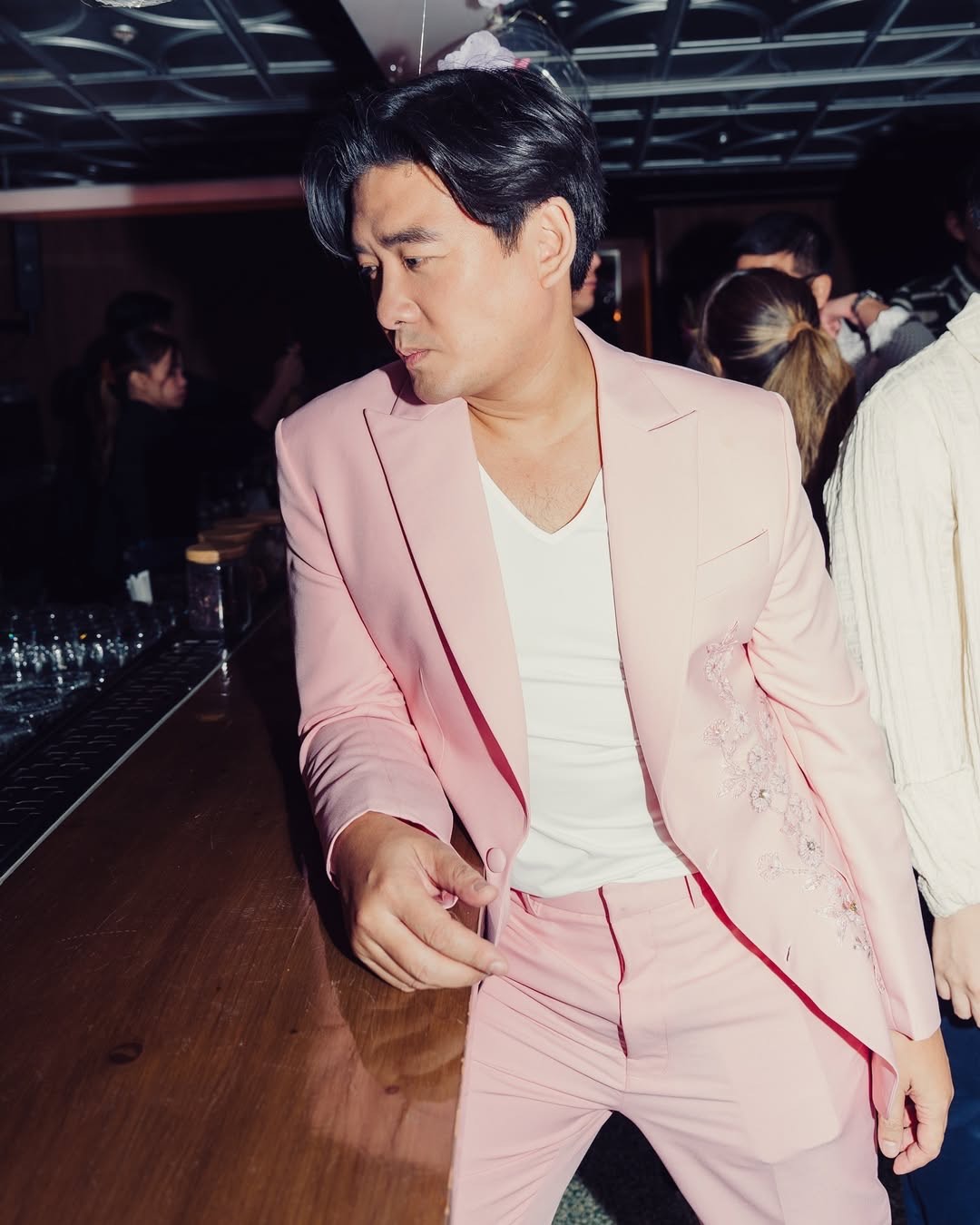Chinoy celebrities share how they manage their own brands, time, and finances
We always see them online and on television, but these Filipino-Chinese personalities are shining as hands-on founders of their own brands, too.
Chinoys are known to be business-minded, with their minds filled with ideas that they just can't wait to turn into a reality. Aside from their hard work, they are also admired for how they seem to just be able to squeeze everything in and handle their finances wisely.
Take inspiration from these Chinoy celebrities who are making a name for themselves not just in the entertainment industry but also in the world of business as they share how they are managing their brands, time, and money as multihyphenates.
Benedict Cua: Actor, content creator, and entrepreneur
“It’s Ben a while!”
At 25 years old, Benedict Cua quit his 9 to 5 job at a multinational company and took the lead in their family business. "I onboarded as the boss of everyone and that was very challenging because the approach in corporate was very different compared to business," he told PhilSTAR L!fe. "Sa actual business, you take on the role of everyone—HR, finance, operations, ikaw 'yung lahat eh."
While it taught him a lot, he was still looking for other things that would make him happy. He eventually found joy in content creation in 2018, producing content about all things lifestyle—from food to travel. He also opens up about his life on his vlogs from time to time.
On the side, he manages Naked Collagen, a supplement brand he co-founded with his mentor, who serves as its CEO. "I think the reason I decided to put up a brand with him was because I was super anxious about the future. Being a freelancer alone is not stable, so there are times you're okay, there are times you're not," he said.

According to Benedict, he "wanted something that's more stable" and "more like an assurance for my future," which includes his little ray of sunshine, Aleck.
He makes sure to stay hands-on as he wears multiple hats as a father, content creator, and entrepreneur.
"It’s possible if you know how to split your time," he emphasized. "I think the key is to try to organize your days. I feel like when we spend our time being perplexed, we’re wasting time."
For him, knowing everything that's happening in the business is key. "If you don’t know what’s happening, that’s the beginning of pagpapabaya or, maybe not intentionally, inadvertently, may namimiss ka," he shared. "But if you’re aware of everything, you start to organize, you start to delegate. The common misconception about business is you need to do everything all the time but without knowing how to delegate and distribute work, mahirap siya i-pull off."
Benedict has always been into business as he grew up in a Chinoy family that's strict with finances. "When I was young, we always struggled with money. When I was studying in school, I tried to copy what they’re doing in business," he recalled. "I was selling goggles sa mga lab classes namin. I bought them sa Binondo sa 168 and sold them in La Salle, cheaper than bookstore price. Sometimes, I would save my allowance so I could buy a laptop because we didn't have that kind of money. It’s a good struggle, it taught me a lot of things."
"One thing I learned, and it still sticks to me now, is if you don’t need it, you don’t need it. There’s no excuse," he mused. "But if you want it, make sure the thing you bought, you’d be able to afford that 10 times or 15 times. I get that, sometimes, whatever makes us happy, we need it. But survival-wise, hindi siya need. That’s what I learned from them."
He remains wise with his money through budgeting and investing."In 100%, 50% would cover your basic needs, your bills; 30% savings; 20% other stuff like leisure, food," he said. "Aside from budgeting, I think investing really helps a lot. Investing is good especiallly in things that appreciate, things that make money whether it’s land, gold, or business. The word investing is investing so it’s not gonna go to waste."
Aside from stressing the importance of knowing that business is risk and that you shouldn't let your money sit still, Benedict emphasized that the best investment, still, is when you invest in yourself. "Don't think of it as a liability. If you invest in yourself enough, you’ll do even greater things. If you don’t feel good, it’s hard to produce something or build something. It has to start from within."
Gretchen Ho: Broadcast journalist, host, and founder of 'Woman in Action' Studios
From the volleyball scene, Gretchen Ho focused on media work to pursue her love for telling stories and public service. Her passion also shines in "Woman in Action" Studios, which she founded during the COVID-19 pandemic and used as a platform for bike donation drives to help those whose jobs were affected during the lockdown. It eventually turned into a travel, adventure, and documentary show that "seeks to go off the beaten path to tell stories that are relevant, courageous and immersive" on TV, where she also anchors ONE NEWS' nightly primetime newscast The Big Story. On the side, you would also see her hosting events.
Growing up as a Chinoy with her parents who were also into business, Gretchen has kept in mind the importance of working hard. In an interview with PhilSTAR L!fe, she said she's been focused on increasing her value now that she's still young and has so much energy to do everything she wants. "I take all the opportunities I can to expand your world, widen my network, develop my skillset, and deepen my understanding. I take advantage of the flexibility, agility and energy that I have to increase your value. Whether as a talent, or as a business, it's value that people pay for, anyway."
The Woman in Action has always been mindful of how she spends and grows her money. This is why as soon as she started working, she made sure to save money and make some investments as early as she could, while she still has the advantage of time to grow them. "I've been really deliberate in setting aside a portion of my money for the longer term," she said, acknowledging that this requires a lot of discipline. "When monthly amortization gets painful, I just think of it as putting money into a piggy bank that multiplies along with the value of the asset I'm paying for. My money becomes double if I'm able to buy at a pre-selling or discounted rate."

But beyond that, the television presenter mentioned she's also gathering multiple income streams over time. When asked for advice on how she does it, she suggested widening one's portfolio by learning about time deposits, UITFs, mutual funds, stocks, and e-wallets with high interest. "P10,000 can earn you P400-700 pesos in a year. Imagine if you multiply that by 10 or 100? There are many opportunities to increase your financially literacy nowadays! Your savings could earn you some more while you kick butt out there."
Gretchen, however, said it's still important to make sure that the risks you're taking are manageable, especially since they involve money. "Work with only what you can handle. Don’t risk everything in one investment," she said. "But remember that not moving and not doing anything are also risks in themselves. You lose what you can do with time. So act, but act moderately, and with good discernment."
Speaking from experience, the best money advice she could give is to live simply. "As your income increases, if you keep the same lifestyle, then your savings also increase. Don’t buy what you don’t need, but give yourself some leeway to take good care of yourself. After all, you’ve worked hard for your money."
"I don’t have anything against those who buy luxurious goods, but I once told my mom that her luxury bag worth P300,000 could have bought her 300,000 pandesals!" she said with a laugh.
Tim Yap: Events host, content creator, and entrepreneur
"All the things that I do, I am very much in love with," said Tim Yap, the ever-so-energetic multihyphenate who is the president and CEO of Yaparazzi Events, an events and PR firm that executes events across the globe. The content creator and host also has different bars that invigorate the night life in Manila under The Palace Group, which handles Xylo, Revel, Clubhouse, and Yes Please, among others. He also has investments on start-ups here and there, and is looking to start more brands soon.
"People always say you should have many eggs in one basket. I always believe you can have many baskets and many eggs. Each basket can produce a separate set of eggs—omelette, scrambled, sunny side up, all these different ways of enjoying eggs," he told L!fe.
How does Yap seem to do it all? "Time management, which I'm still in the process of being better at. But what I am a master of is injecting energy into all these passions of mine. I devote 150% of my energy into each and every endeavor I put my name into. I think passion and energy are both my strong points and I really put as much as I can in every industry I move in."

His other secret is taking "lots of naps." He said, "In my van, I sleep so when I wake up, I have lots of energy. You give me a quiet moment and some good airconditioning and I’m asleep."
Tim said his love for work and business "came naturally" as he grew up "with a very conservative Chinese Catholic upbringing" where they were always in some form of business endeavor, "an exhange of goods."
When he was in first grade, he sold stickers to his friends. He also helped out with his family business at their Binondo warehouse as a stockroom staff. "I was the bodegero. I was the one going making sure that the stocks coming out of the warehouse had the right number. My mother made sure I would be exposed to the business very early," he shared. "What I was exposed to was work ethic, dealing with people, treating everybody with respect whether they are your superior, whether they are working for you or for your family."
Tim said they didn't have much growing up, so he was quick to learn the value of money. "Many times I struggled, many times I wanted many things. I was a very ambitious child. Everything was a struggle—from not having a lot, I had to work hard to achieve the things I wanted, to be able to do the things I wanted in life."
A big believer of hard work, the TV personality is able to enjoy the fruits of his labor now, but still makes sure to stay wise with his finances as he earned his money the hard way. "It was not inherited, it was not given on a silver platter at all," he noted.
"I spend wisely. Maybe some people won’t agree with that because I love art, I love fashion, there are some things I spend on. But somehow, the balance sheet is there at the back of my head and I know when I’m overspending already," he shared with L!fe. "I work super, super hard, I work like I’m a poor man in terms of financials. I never say no to hard work. I embrace it, I’m not scared of it, because I know that I have expenses, I know I have certain things in my life I want to enjoy and that costs money."
After all, Tim said it's all about having a good relationship with money. "Trust me: It will grow if you know how to enjoy it, too."
Richard Juan: Actor and entrepreneur
Richard Juan is an actor who started his showbiz career as a housemate on the reality show Pinoy Big Brother. His love for the entertainment scene became even more evident when he started 28 Squared Studios, where he's able to combine his hobbies in one company.
"My business started during the pandemic and to see it grow to where it is right now is something I’m proud of. We are a film, TV, content production company. We produce corporate videos for companies, digital ads, or even full blown ads. We also include content like writing, we write content for websites or brands also," he told L!fe.
28 Squared Studios was behind the 2024 film Under Parallel Skies, which starred Janella Salvador and Thai actor Win Metawin. "It's currently now on Netflix worldwide. We were the first Filipino romance film that Warner Bros distributed," he said.

Aside from this, he also dabbles on a couple of business ventures like Hong Kong-based Two Infinity Entertainment, where he serves as managing director. He's also looking to work on some projects in the food and beverage scene in the near future.
Richard has always been into business. He made his first money when he was in Grade 7 by selling tickets to a three-day weekend event in Hong Kong. "That was the very first time I tried something like that. Dati, may mga times pa, I knew some who wouldn’t bring pens, paper, whatever, minsan binebenta ko pa from home. But that's all these silly things I did just because I was exposed to the world of business at a young age," he said.
His Chinoy family instilled in him a lot of valuable lessons during his childhood years. "My parents, from a very young age, taught me how money works, how the financial system works. I remember very vividly, when I didn't even write properly yet, I would be writing checks on behalf of my mom. Of course, siya 'yung pipirma, but I really became famioliar with how all these things work."
"They also taught me the importance of hard work and that success is never something that is handed to me. I never saw family money as my money. I think my parents somehow instilled that to me at a very young age, so it never crossed my mind that I’m gonna be inheriting everything," he continued.
Richard noted that everything he's built so far is from the hard work he put in his job in entertainment for the last ten years.
As he takes his entertainment career and business ventures more seriously, he makes it a point to follow a strict schedule through time-blocking. "My calendar on my phone is the best thing ever. I plan my sleep, I plan my meals, what time I’m supposed to eat, I plan my workouts, how much time I have. If you time-block stuff, you kind of have this additional pressure na parang you have to finish all of this within this time period. Time-blocking is the secret weapon," the Chinoy entrepreneur said.
For those who are hoping to start a business someday, he said, "Be very agile because there are so many things that could happen in a business that you don’t expect. You could plan everything, you look at everything, you think this is gonna be perfect, but there’s always something that you don’t foresee that you have to be agile enough and quick on your feet to adjust."
He also advised separating your finances clearly. "Even from the start of the business, you have to make sure that your business is your business money and your business is not your ATM. You don’t pull money off the business. You always think separately that business is like another person. Anything you want to do, you have to grow the business."
Lastly, it's also good to know when it's time to throw in the towel and admit defeat. "Don't be emotional. Sometimes, itong project, lugi 'to. It’s better to cut your losses early than hold on to something and think it might come back better. You have to remember that sometimes, you have to lose in order for you to win big."


